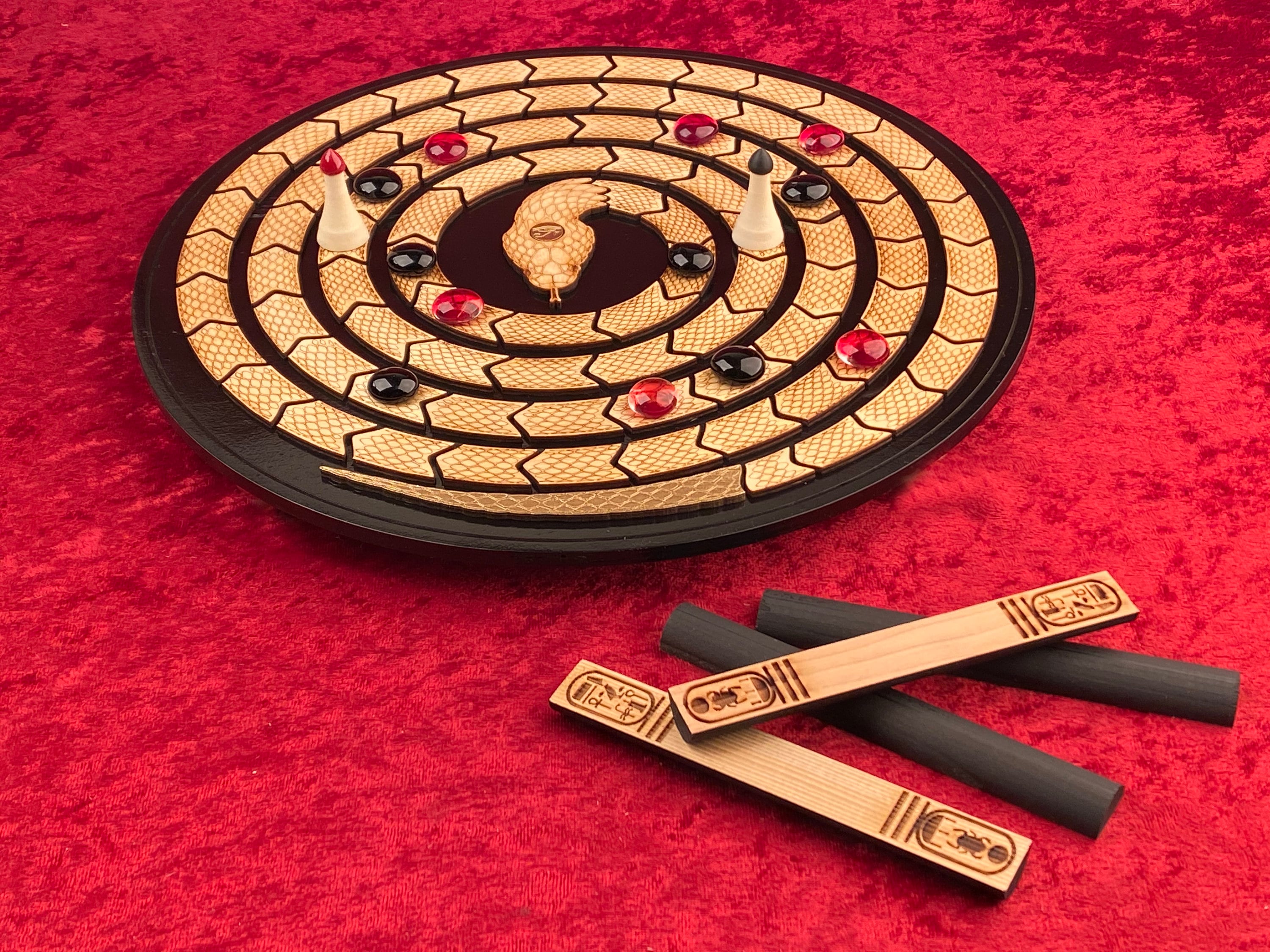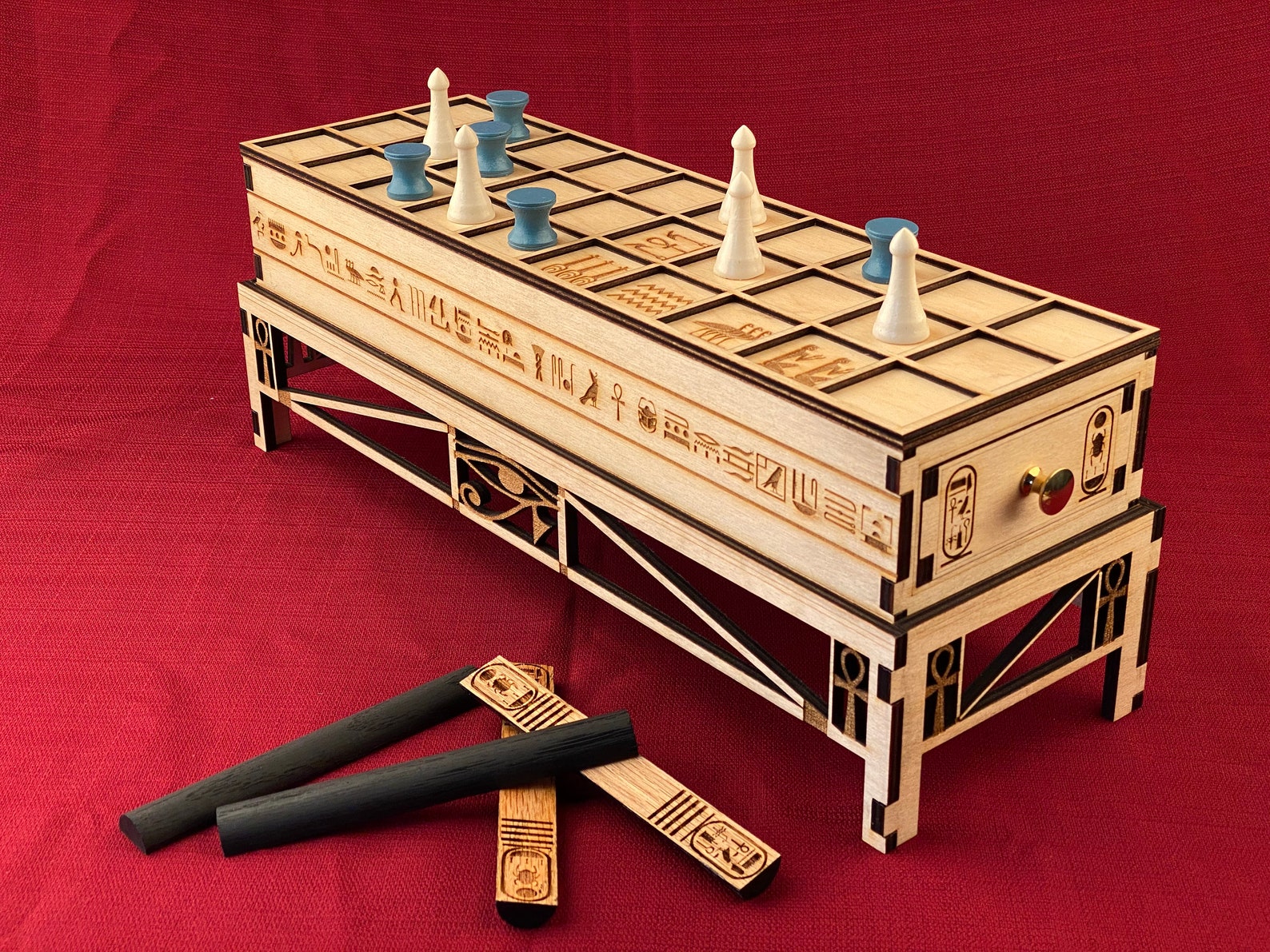Hadballa: The Ancient Egyptian Game Of Strategy And Skill
Source: woodexpressions.com
Hadballa: The Ancient Egyptian Game Of Strategy And Skill Was invented or originated in ancient Egypt thousands of years ago and is still played today. It is a two-player game played on an 8x8 board with 16 pieces per player.
Editor's Notes: "Hadballa: The Ancient Egyptian Game Of Strategy And Skill" has published today. It has some fun new content for everyone who wants to learn more about ancient gaming history. This article is a great place to start if someone new to Hadballa looks to gain insight and if someone already familiar with the game who wanna refresh their knowledge.
We've done some analysis and digging, and we've put together this Hadballa: The Ancient Egyptian Game Of Strategy And Skill guide to help you make the right decision.
| Key Differences | Key Takeaways |
|---|---|
| Hadballa: The Ancient Egyptian Game Of Strategy And Skill is a two-player game played on a board with 16 pieces on each side. | |
| The pieces are moved like a chess king, one square at a time, in any direction. | The objective of the game is to capture all of the opponent's pieces. |
| Hadballa: The Ancient Egyptian Game Of Strategy And Skill is a challenging and strategic game that can be enjoyed by people of all ages. | It is a great way to learn about ancient Egyptian culture and history. |
Main article topics
FAQ
This FAQ section provides comprehensive answers to frequently asked questions about Hadballa, the ancient Egyptian game of strategy and skill.

MEHEN the Ancient Egyptian Game of the Pharaohs. an Ancient | Etsy UK - Source www.etsy.com
Question 1: What are the origins of Hadballa?
Hadballa has ancient roots, dating back to the Predynastic Period of Ancient Egypt (c. 6000-3100 BCE). Archaeological evidence suggests that the game was played on a board similar to the modern Senet game, using pawns and dice. Over time, the game evolved and spread throughout the ancient world, with variations found in Mesopotamia, Greece, and Rome.
Question 2: How is Hadballa played?
Hadballa is played on a 5x5 board with two players, each controlling 12 pawns. The goal is to capture all of your opponent's pawns or block them from moving. Players roll dice to determine the number of spaces their pawns can move. Pawns can capture opponents by landing on the same square, and they can also stack on top of each other to create a "tower" that is immune to capture.
Question 3: What are the strategies involved in Hadballa?
Hadballa requires strategic thinking and tactical planning. Players must consider the position of their pawns, the potential moves of their opponent, and the probabilities of rolling certain dice combinations. Controlling the center of the board is crucial, as it allows for greater mobility and flexibility. Additionally, stacking pawns strategically can protect them from capture and create opportunities for offensive maneuvers.
Question 4: What are the benefits of playing Hadballa?
Playing Hadballa offers several cognitive and social benefits. It improves problem-solving skills, develops logical reasoning, and enhances spatial awareness. The game also fosters strategic thinking, patience, and the ability to make quick decisions under pressure. Additionally, playing Hadballa with others promotes social interaction, communication, and healthy competition.
Question 5: How can I learn to play Hadballa?
There are several resources available to learn how to play Hadballa. Books and online guides provide detailed instructions and strategies. Additionally, online platforms and mobile apps offer interactive experiences that allow players to practice and compete with others.
Question 6: Is Hadballa still played today?
While Hadballa is not as widely played as it was in ancient times, it has experienced a resurgence of interest in recent years. Modern adaptations of the game have been developed, and tournaments are held internationally. Hadballa serves as a fascinating glimpse into ancient Egyptian culture and a testament to the enduring power of strategy and skill-based games.
Through this FAQ, we have explored the origins, gameplay, strategies, benefits, and accessibility of Hadballa. This ancient game continues to captivate and engage players today, providing a unique and enriching gaming experience.
To further delve into the world of ancient board games, explore our comprehensive article on the many fascinating board games played in ancient Egypt.
Tips
Hadballa is a game of strategy and skill similar to modern-day chess. The gameplay requires dexterity, thinking, and strategy, making it both challenging and rewarding.
Tip 1: Learn the basics thoroughly before playing.
Tip 2: Practice regularly to improve your skills and strategies.
Tip 3: Be patient and observant of your opponent's moves.
Tip 4: Think several moves ahead and anticipate your opponent's countermoves.
Tip 5: Master the art of bluffing and distraction to catch your opponent off guard.
Tip 6: Don't get discouraged by losses. Use each game as a learning experience.
Tip 7: Study the strategies and techniques of experienced players to enhance your gameplay.
Hadballa: The Ancient Egyptian Game Of Strategy And Skill
Hadballa, an ancient Egyptian game of strategy and skill, holds immense historical and cultural significance. It showcases the ingenuity and strategic thinking of the ancient Egyptians and provides insights into their daily life. Key aspects of this game include:
- Skillful Gameplay: Required dexterity and tactical planning.
- Strategic Moves: Elaborate strategies influenced the outcome.
- Board and Pieces: Unique grid and playing pieces added complexity.
- Social Significance: Played by people of various social classes.
- Historical Importance: Reflects ancient Egyptian culture and ingenuity.
- Cultural Symbolism: Often depicted in art and hieroglyphics.

Ancient Egyptian Game of SENET King Tut's Game Egypt | Etsy - Source www.etsy.com
These aspects collectively highlight the importance of Hadballa as a strategic game that fostered cognitive abilities, provided entertainment, and served as a cultural symbol in ancient Egyptian society. Understanding these aspects enhances our appreciation for the richness and complexity of this ancient civilization.

Wood Senet Game – An Ancient Egyptian Board Game – Wood Expressions - Source woodexpressions.com
Hadballa: The Ancient Egyptian Game Of Strategy And Skill
Hadballa, an ancient Egyptian board game, is a testament to the ingenuity and strategic thinking of the ancient Egyptians. This game, played on a board of squares, involves two players who move their pieces across the board, capturing each other's pieces and ultimately attempting to capture the opponent's king piece.

The Game of SENET King Tutankhamun's Game of Skill and Strategy From - Source www.pinterest.com
Hadballa's significance lies in its connection to ancient Egyptian culture and its representation of strategic thinking and skill. It offers insights into the lives and pastimes of ancient Egyptians and sheds light on the development of strategy and board games throughout history. Furthermore, understanding Hadballa can provide valuable insights into the cognitive abilities and problem-solving skills of ancient Egyptian society.
Hadballa's practical significance extends to its applications in educational and recreational settings. The game can help develop strategic thinking, problem-solving skills, and spatial reasoning abilities in individuals. It can also serve as a fun and engaging way to learn about ancient Egyptian history and culture.
Hadballa - Key Insights
| Concept | Significance |
|---|---|
| Strategic thinking | Enhances critical thinking and decision-making skills. |
| Problem-solving | Develops logical reasoning and problem-solving abilities. |
| Spatial reasoning | Improves visualization and spatial orientation skills. |
| Historical and cultural significance | Connects players to ancient Egyptian history and culture. |
Conclusion
Hadballa stands as a testament to the strategic brilliance and cultural richness of ancient Egypt. Its connection to cognitive abilities, strategic thinking, and cultural heritage makes it a valuable subject for study and a source of insights into the human capacity for problem-solving and the evolution of board games throughout history.
Preserving and promoting the knowledge of Hadballa can help us appreciate the ingenuity of ancient civilizations and inspire future generations to explore the realms of strategy and skill.
Cristiano Ronaldo: The Legendary Striker, Everton Vs. Leicester City: Battle Of The Blues And Foxes, Sport X Santa Cruz Live: Witness The Thrill Unfold, 2023 FIFA Women's World Cup: Teams, Fixtures, Results, And More, Ceará Futebol Clube: The Pride Of Fortaleza, Danielle Winits: Versatile Brazilian Actress, Singer, And Model, Ingressos Palmeiras: Compre Agora E Garanta Seu Lugar Nas Arquibancadas Do Verdão, Slovan Bratislava: History, Glory, And Unwavering Spirit In Slovak Football, Nantes Edges Out Stade Brestois In Thrilling Ligue 1 Clash, Juventude Vs. Grêmio: Clash Of Brazilian Footballing Giants,